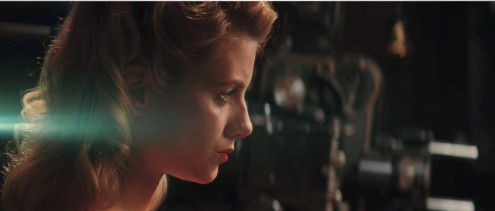Inglourious Basterds (Tarantino, 2009)

“Cinema is the most beautiful fraud in the world.” – Jean-Luc Godard
Inglourious Basterds is essentially a complex and creative lie, demonstrating film’s ability to interpret and distort the truth to suit the vision of the filmmaker. This vision is of a violent revenge fantasy against the Third Reich, in which the Nazis thoroughly get what they deserved, satisfyingly dealt out by the Jews. The truth, here, is irrelevant – this is an alternate history, where cinema shapes fate, and writes a future where the heroes triumph over the villains. It’s not quite that simple, but what the film boils down to is that it allows us to see what we want to see, the version of history that victims of the regime wished was true, done up with exciting cinematic flourishes that consistently remind us of the illusion. Because it plays so fast and loose with history, this is a much more entertaining and provocative entry into the canon of WWII films than recent offerings such as Valkyrie, which strive to honor the real men that died trying to take down Hitler, and failed in their mission. This disparity poses an interesting question: does cinema have an obligation to the truth? The propaganda of Joseph Goebbels and Leni Riefenstahl play a large part in the story, again suggesting the power of cinema to distort the truth and persuade the audience of the filmmaker’s ideals. This was dangerous, because they were the only voices allowed to speak, but are Tarantino’s aims noble? By rewriting history, is an injustice served to the real memories that people carry? Or do we gain something by collectively participating in this fantasy in which the world operates by the logic of cinema?
There is no easy answer, because film is subjective and we each take away something different from the experience. There is no sacred law which decrees that film must depict the world as it is, just as any artist has the right to express himself however he chooses. Vladimir Nabokov believed that the artist held no social responsibility, and that the quality of art should not be measured by the effect it has on the interpreters. If someone is offended by Tarantino’s graphic imagery of American vigilantes scalping German soldiers, it does not lessen the quality of the film itself, which is smartly constructed in chapters consisting of long scenes of dialogue usually climaxing in violence or the expression of violent emotion. Melanie Laurent and Christoph Waltz play off each other the most deliciously in a long conversation over strudel, in which she attempts to hide her overwhelming pain at the knowledge that he killed her family four years prior, while he rambles on amiably, concealing his own darkness.
Waltz as Hans Landa, head of the SS, is the film’s revelation. Deemed “The Jew Hunter” by the Allied media, he is cunning and ruthless, yet perfectly elegant. He speaks perfect German, English, French, and Italian. He speaks enthusiastically, collecting linguistic oddities, delighting in small details, such as delicious milk or a fashionable shoe. Yet he is a complete mystery, giving alternate opinions on his unofficial title, never revealing how he truly feels. The truth, of course, is irrelevant. It is the illusion that matters. Both the writing and the performance are masterful sleights of hand, revealing the ability of cinema to create a perfect fake, while the explosive finale of the film hints at cinema’s ability to destroy, both literally and figuratively, as the dissenting voice of the artist can create social and political change. Inglourious Basterds perhaps suffers from this emphasis on artifice, as it feels a bit hollow, like a grand spectacle without real humanity. Yet this unique approach to a tired subject brings out fresh themes and ideas, and the end result is gloriously entertaining.